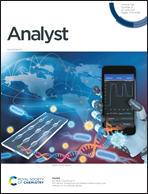Liposome-assisted enzyme catalysis: toward signal amplification for sensitive split-type electrochemiluminescence immunoassay†
Abstract
Developing an efficient signal amplification strategy is very important to improve the sensitivity of bioanalysis. In this paper, a liposome-assisted enzyme catalysis signal amplification strategy was developed for electrochemiluminescence (ECL) immunoassay of prostate specific antigen (PSA) in a split-type mode. The sandwich immunoreaction occurred in a 96-well plate, and glucose oxidase (GOx) encapsulated and antibody-modified liposomes were used as labels. The ECL detection was carried out using a rGO-Au NP modified glassy carbon electrode (GCE). The large amount of generated H2O2, i.e. the coreactant of the luminol system, and the excellent catalytic behavior of rGO-Au NPs greatly boosted the ECL signal, resulting in the signal amplification. The developed ECL immunosensor for detecting PSA achieved a wider linear range from 1.0 × 10−13 to 1.0 × 10−8 g mL−1 and a detection limit of 1.7 × 10−14 g mL−1. The application of the proposed strategy was demonstrated by analyzing PSA in human serum samples with recoveries from 89.0% to 113.0%, and relative standard deviations (RSDs) were less than 6.6%. This work provides a new horizon to expand the application of liposomes for ECL bioanalysis.



 Please wait while we load your content...
Please wait while we load your content...